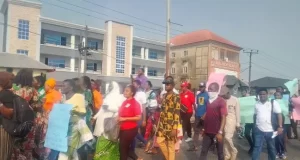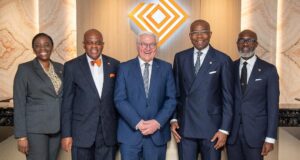……..by Ben Ndubuwa…..
The Federal Government of Nigeria has signed a significant agreement with the European Union (EU) and the German Government, committing £17.9 million to support the country’s off-grid electricity initiative.
This funding will be instrumental in advancing the third phase of the Nigerian Energy Support Programme (NESP), aimed at enhancing investments in renewable energy, energy efficiency, and rural electrification.
At the launch and steering committee meeting for NESP III, Inga Stefanowicz, the Head of Section Green and Digital Economy at the EU Delegation to Nigeria and ECOWAS, emphasized the collaborative nature of this endeavor. “Achieving a cleaner future is the business of all stakeholders,” she stated, highlighting the EU’s ongoing support for Nigeria’s energy security plans. She added, “As we are launching this third phase, there is more for us ahead. 154,000 people will have new or improved access to electricity under this new phase, and 30,000 people will gain access to LPG for clean cooking.”
The project is set to generate eight megawatts of additional renewable energy capacity, marking a significant step toward a sustainable energy future. Stefanowicz explained, “The EU is pleased to have commissioned additional funding… bringing a new landscape to the concept of electricity franchising, attracting renewable energy investments, and ensuring reliable power supply to its beneficiaries.”
German Deputy Ambassador Johannes Lehne reaffirmed his country’s commitment, stating, “Technologies and investments for renewable energy and energy efficiency will be key for diversifying Nigeria’s energy mix and decarbonising critical sectors.” He noted that the German Federal Ministry for Economic Cooperation and Development contributed €8.9 million to the project, further underscoring the collaborative effort to enhance Nigeria’s energy capabilities.
The Permanent Secretary of the Ministry of Power, Mahmuda Mamman, highlighted the project’s potential impact, stating, “The project will help close the gap of 100 million Nigerians not having access to electricity.” He noted that renewable energy plays a vital role in overcoming the electricity challenges faced by unserved rural communities.
Duke Benjamin, Head of Programme at NESP, echoed these sentiments, stating that the initiative, which began in 2013, aims to provide electricity to remote areas not connected to Nigeria’s national grid. Despite previous phases increasing access to electricity, Nigeria continues to face significant energy challenges, with the national grid collapsing multiple times in 2024 alone.
As Nigeria struggles with a power generation capacity of only 5,000 megawatts for its over 200 million citizens, this new partnership offers hope for addressing the critical energy needs of the nation.
 Financial Energy Review
Financial Energy Review





